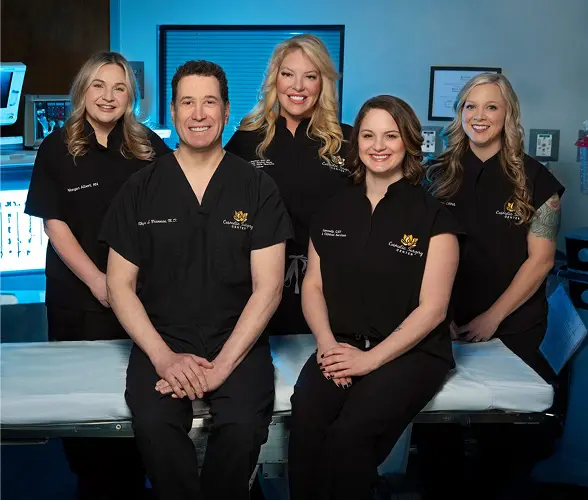- What COVID-19 protocols are in place at Cosmetic Surgery Center?
- What is coronavirus (COVID-19)?
- What are the symptoms of coronavirus?
- How does COVID-19 spread?
- How can you prevent coronavirus?
- Local Arkansas resources for COVID-19 information »
- Resources for global information about coronavirus »
What COVID-19 protocols are in place at Cosmetic Surgery Center?
The health of our patients and staff is of the utmost importance to us. Due to the surging numbers of COVID in Arkansas, we will be implementing the following protocols in our practice:
Clinic & Med Spa:
-Please wear a surgical or N95 mask to your appointment – No cloth masks
-Family members will NOT be allowed to accompany patients into our waiting consult and treatment rooms. There are places to sit within our building and they are welcome to wait for you in those spaces
Surgical Patients:
-Testing will be required prior to your surgery regardless of your immunization status
-If you test positive for COVID prior to your surgery, the Cosmetic Surgery Center will use the following timeline when rescheduling your procedure:
(The timeline is based from the date of your COVID-19 diagnosis to surgery)
- Four weeks for an asymptomatic patient or recovery from only mild, non-respiratory symptoms
- Six week for a symptomatic patient (e.g. cough, dyspnea) who did not require hospitalization
- Eight to 10 weeks for a symptomatic patient who is diabetic, immunocompromised, or hospitalized.
- Twelve weeks for a patient who was admitted to an intensive care unit due to COVID-19 infection
Our staff is committed to your safety. We will continue our in office protocols which include:
- Wearing N95/surgical Masks
- Cleaning treatment and consult rooms between patients
- Limiting the number of patients in the waiting area
- Cleaning the waiting areas throughout the day
We appreciate your patience as we navigate our way through the next few weeks. If you have any questions or concerns, please do not hesitate to call our office.
What is coronavirus?
There’s no question that we’ve all heard about novel coronavirus, but what is it exactly? COVID-19 is a viral respiratory illness that was first identified in late 2019 after an animal-to-human transmission. “Novel” viruses are those that have not been identified in humans—and thus humans have no antibodies to the virus yet. This can make diagnosis, treatment, and prevention particularly difficult, as most viral vaccines are developed through researching how the human body has responded to the virus previously.
Coronavirus is transmissible between humans and is currently spread throughout the world.
What are the symptoms of coronavirus?
Symptoms of COVID-19 typically appear between two to fourteen days after exposure, and they range in severity. Symptoms include mild-to-severe dry cough, shortness of breath, fever or chills, fatigue, muscle or body aches, headache, new loss of taste or smell, sore throat, congestion or runny nose, nausea or vomiting, or diarrhea. In some patients who are at-risk due to age or preexisting conditions, pneumonia may develop in both lungs.
If symptoms become severe or concerning, seek emergency medical care. Signs of an emergency may include trouble breathing, persistent pain or pressure in the chest, new confusion, inability to stay awake or to wake up, or a change in skin tone that appears pale, gray, or blue.
How does COVID-19 spread?
COVID-19 spreads from person to person in a few ways, including:
- Respiratory droplets from an infected person (coughing, sneezing)
- Conversation and touch between people who are in close contact
- Touching a surface that has been touched by an infected person and then touching your face
How can you prevent coronavirus?
The vaccine for COVID-19 is available to all Americans ages 12 and up. If you are able, getting vaccinated offers the best possible protection from coronavirus infection. Learn about the vaccine here and locate a free vaccine near you in Arkansas here »
If you are unvaccinated, it is recommended that you prevent transmission by avoiding exposure in the first place. The Centers for Disease Control and Prevention (CDC) recommends getting vaccinated; however, if you are unable to get the vaccine, or if you have a weakened immune system despite being fully vaccinated, there are a number of preventative actions to employ in daily life, including:
- Wear a mask over your nose and mouth in indoor public places.
- Stay 6 feet away from people who are not a part of your household.
- Avoid crowds and poorly ventilated spaces.
- Frequently wash your hands with soap and warm water for at least 20 seconds. Use of at least 60% alcohol hand sanitizer will work in a pinch, but soap and water remain the best option.
- Cover coughs and sneezes with a tissue and throw the tissue away OR cough into your elbow and then wash your hands and change your shirt.
- Avoid touching your eyes, nose, and mouth with unclean hands or after any public interaction.
- Avoid close contact with people who are sick.
- Disinfect high-contact surfaces in your home, including counters, doorknobs, handrails, etc.
- Familiarize yourself with the symptoms of COVID-19, and monitor your health daily.
Local Arkansas resources for COVID-19 information
To stay up-to-date with local COVID-19 information, we encourage you to frequent the following sites:
Resources for global information about coronavirus
Misinformation has a tendency to spread much faster than the coronavirus itself, so it’s important to look to trusted organizations for information. For details on the virus and updated news on its spread, we recommend the following pages:
